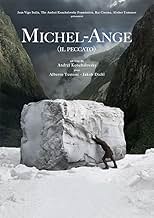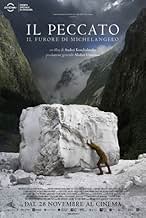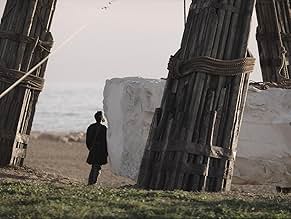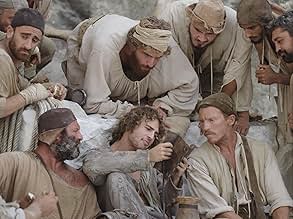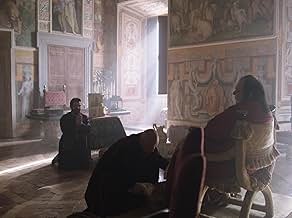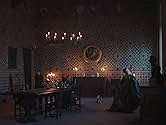Il peccato
- 2019
- 2 h 14 min
AVALIAÇÃO DA IMDb
6,8/10
1,5 mil
SUA AVALIAÇÃO
A vida de Michelangelo Buonarroti.A vida de Michelangelo Buonarroti.A vida de Michelangelo Buonarroti.
- Direção
- Roteiristas
- Artistas
- Prêmios
- 3 vitórias e 2 indicações no total
- Direção
- Roteiristas
- Elenco e equipe completos
- Produção, bilheteria e muito mais no IMDbPro
Avaliações em destaque
Watching this film you might wonder "What on Earth this has to do with Michelangelo, except for the decorations?"
While it is a good idea to try a character and period study, rather than a glamorous Hollywood-style biopic, this film is a blank shot at it. On the one hand the cast is interesting, the non-professional actors play well (though such cast would fit better Boccaccio's "Decameron"). The film overall slightly reminds films by Fellini or Milos Forman's "Amadeus" - where there are many grotesque moments, the main character could be almost a caricature but Forman unlike Konchalovsky manages very well the contrast between comical and tragic. In the "Sin" the grotesque is purposeless, because the script is very weak, the storytelling is not engaging and the main character never steps out from the void of half-craziness. In Forman's film Mozart could look dumb, but as soon as music started he turned into a genius. Konchalovsky's Michelangelo only counts coins, argues contracts and purchases marble. He never touches a chisel or brush, he is never shown as a thinker or a poet. There is no moment to sympathize with him or understand why such person could create great art. It is an empty caricature rather than a human.
To sum up, this film is an unfortunately waste of promising actors and excellent Tuscan scenery. Some snapshots are well done because the cast and the decorations are good. But overall you will not gain much by watching this half-baked production, unless you are interested in evolution of Konchalovsky as a director.
While it is a good idea to try a character and period study, rather than a glamorous Hollywood-style biopic, this film is a blank shot at it. On the one hand the cast is interesting, the non-professional actors play well (though such cast would fit better Boccaccio's "Decameron"). The film overall slightly reminds films by Fellini or Milos Forman's "Amadeus" - where there are many grotesque moments, the main character could be almost a caricature but Forman unlike Konchalovsky manages very well the contrast between comical and tragic. In the "Sin" the grotesque is purposeless, because the script is very weak, the storytelling is not engaging and the main character never steps out from the void of half-craziness. In Forman's film Mozart could look dumb, but as soon as music started he turned into a genius. Konchalovsky's Michelangelo only counts coins, argues contracts and purchases marble. He never touches a chisel or brush, he is never shown as a thinker or a poet. There is no moment to sympathize with him or understand why such person could create great art. It is an empty caricature rather than a human.
To sum up, this film is an unfortunately waste of promising actors and excellent Tuscan scenery. Some snapshots are well done because the cast and the decorations are good. But overall you will not gain much by watching this half-baked production, unless you are interested in evolution of Konchalovsky as a director.
This movie has left me without blinking during the more than two hours it lasts. With beautiful photography, a hard and dry plot, and hypnotic images for its approach to an Italian Renaissance as it must have been in reality, dirty, poor and tremendously unfair.
The actors seem sculpted against the beautiful background of Tuscany with the same rawness that we find in Pasolini's films. We must not forget that Konchalovskiy collaborated with Tarkovsky in the birth of the story of another tormented artist, 'Andrei Rublev', one of his masterpieces.
From the beginning of the film we see Michelangelo in his maturity, when the intense and fierce compulsion of his sculptural works, which seem to relax only in his 'Pieta', are those of a man pursued by 'the devil' -as his character says-, obsessed by money, in a purely masculine world, far from femininity, compassion and subtlety.
The central scene of 'Il Peccato' has been compared to a certain scene in the movie 'Fitzcarraldo' and they are not wrong, because there is dementia linked to the search for a goal that constantly escapes, no matter how much effort is made, and all this is told in a way that takes your breath away. Although it is not a drama, it is the life of someone at the limit of his strength.
Highly recommended.
The actors seem sculpted against the beautiful background of Tuscany with the same rawness that we find in Pasolini's films. We must not forget that Konchalovskiy collaborated with Tarkovsky in the birth of the story of another tormented artist, 'Andrei Rublev', one of his masterpieces.
From the beginning of the film we see Michelangelo in his maturity, when the intense and fierce compulsion of his sculptural works, which seem to relax only in his 'Pieta', are those of a man pursued by 'the devil' -as his character says-, obsessed by money, in a purely masculine world, far from femininity, compassion and subtlety.
The central scene of 'Il Peccato' has been compared to a certain scene in the movie 'Fitzcarraldo' and they are not wrong, because there is dementia linked to the search for a goal that constantly escapes, no matter how much effort is made, and all this is told in a way that takes your breath away. Although it is not a drama, it is the life of someone at the limit of his strength.
Highly recommended.
Knowledge. Loyalty. Truthfulness. Guilt. Perseverance. Effort. Strength. Love. Spirituality.
If you want to learn a thing or two about the above, it's a must to watch.
Up until the final scene, Il Peccato seems a beautiful chaos, with an apparently random series of scenes that seem to go nowhere in particular. But, alas, the finale might be enlightening.
Konchalovsky's film obviously echoes Andrei Rublev, even though it can't be but a shadow if compared to Tarkovsky's masterwork, by portraying Michelangelo as a troubled artist that feels out of place in his brutal times. Unlike Rublev, Michelangelo is however torn by less religious themes, even though he too complains about the brutality of his commissioners, the Della Rovere and the Medici families. Always in economic difficulties, always aspiring to a sublime that he identifies in poet Dante Alighieri, never able to settle in one place, fueled by an inner omnipresent rage. Ultimately, Michelangelo's titular 'sin' is not revealed, but it might be pride: he makes no secret of how he considers himself to be a genius far above anyone else, he tries to do overly impossible things without accomplishing them entirely. A physical representation of his pride might constitute the huge marble block seen in the poster, that pays a specific role in part of the film.
The cast is made up of less well-known italian actors, but Alberto Testa in particular seems the perfect choice in terms of appearance to play the Renaissance Sculptor. Equally particular is the choice to shoot the movie in 4:3 aspect ratio. The coloring however somehow reminded of Sokurov's Faust.
The main thing I would like to point out is that every single scene from this movie was like a beautiful painting straight out of an Italian museum. I can't remember when was the last time the visuals of a movie stunned me so greatly that I was with each scene change surprised by the beauty of the images.
Secondly, the feeling I get reading the rest of the reviews, and hearing other people comment on the movie, is that that people almost expect this movie to be a some sort of thriller depicting the genius of Michelangelo, the person we all know as the one of the worlds greatest artists of all time. But the greatness of this movie is in the contrary - Michelangelo is portrayed as a mere, sinning human - who steals, betrays, lies, and also hates showering. He is a imperfect person just like any other, haunted by his fears and suspicions and I can't shake off the feeling that people did not (or did not want) to see Michelangelo in those lens. But for me that is the main thing that makes this movie so great - the viewer can share Michelangelos' emotions and thoughts as if they were their own or of their friend, since the artists is another common, but very talanted man, and not some untouchably skilled alien of the past.
Thirdly, the movie shows us only a fragment of the artists life, and a fragment describing the very beginning of the sculpting process, and it is that time that the fullness of Michelangelos' character can be met, like it is in the movie. Who wants to see a historical documentary about his whole life? You can tune into the History channel if your into that. On the other side, the movie is an artistic take at an artists life, excellently describing Michelangelos true identity, his problems and thoughts, related or not to his work.
For me, the point and the idea of the movie is that Michelangelos works such as David and Pieta were not thought up in the vast and luxuriose castles and churches of Florence, while the artists was enjoying a cup of tea snf reading philospophy, but instead, in the middle of a marble mine in high up in the mountains, alongside plain working men, when the idea arises in sight of a mere daughter of one of the workers leans on a marble rock for a short afternoon sleep - it is that plain scene which inspires the divine masterpiece of the artists work today. This is what makes the movie so down to earth and realistic, and in combination with the incredible scenery, makes the viewer feel like he is in 16th century Italy for two hours.
Secondly, the feeling I get reading the rest of the reviews, and hearing other people comment on the movie, is that that people almost expect this movie to be a some sort of thriller depicting the genius of Michelangelo, the person we all know as the one of the worlds greatest artists of all time. But the greatness of this movie is in the contrary - Michelangelo is portrayed as a mere, sinning human - who steals, betrays, lies, and also hates showering. He is a imperfect person just like any other, haunted by his fears and suspicions and I can't shake off the feeling that people did not (or did not want) to see Michelangelo in those lens. But for me that is the main thing that makes this movie so great - the viewer can share Michelangelos' emotions and thoughts as if they were their own or of their friend, since the artists is another common, but very talanted man, and not some untouchably skilled alien of the past.
Thirdly, the movie shows us only a fragment of the artists life, and a fragment describing the very beginning of the sculpting process, and it is that time that the fullness of Michelangelos' character can be met, like it is in the movie. Who wants to see a historical documentary about his whole life? You can tune into the History channel if your into that. On the other side, the movie is an artistic take at an artists life, excellently describing Michelangelos true identity, his problems and thoughts, related or not to his work.
For me, the point and the idea of the movie is that Michelangelos works such as David and Pieta were not thought up in the vast and luxuriose castles and churches of Florence, while the artists was enjoying a cup of tea snf reading philospophy, but instead, in the middle of a marble mine in high up in the mountains, alongside plain working men, when the idea arises in sight of a mere daughter of one of the workers leans on a marble rock for a short afternoon sleep - it is that plain scene which inspires the divine masterpiece of the artists work today. This is what makes the movie so down to earth and realistic, and in combination with the incredible scenery, makes the viewer feel like he is in 16th century Italy for two hours.
Você sabia?
- CuriosidadesShot entirely in Italy. The movie was shot in Rome and its environs and in Tuscany, including at the Carrara quarry where Michelangelo got his marble.
- Citações
Michelangelo Buonarroti: Money always rubs elbows with infamy.
- ConexõesReferenced in Vecherniy Urgant: Andrei Konchalovsky/Pompeya (2019)
Principais escolhas
Faça login para avaliar e ver a lista de recomendações personalizadas
- How long is Sin?Fornecido pela Alexa
Detalhes
Bilheteria
- Orçamento
- € 15.000.000 (estimativa)
- Faturamento bruto mundial
- US$ 243.043
- Tempo de duração2 horas 14 minutos
- Cor
- Proporção
- 1.33 : 1
Contribua para esta página
Sugerir uma alteração ou adicionar conteúdo ausente


![Assistir a Trailer [OV]](https://m.media-amazon.com/images/M/MV5BYThkZDVkMGQtNGZiYS00NzMwLWFkOWUtYTFhYThiN2E4MTQwXkEyXkFqcGdeQXRyYW5zY29kZS13b3JrZmxvdw@@._V1_QL75_UX500_CR0)
